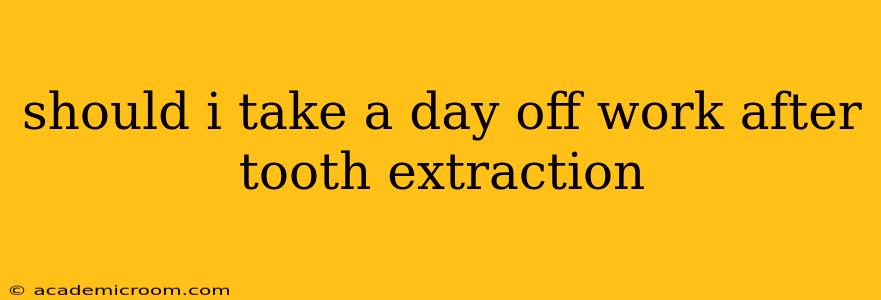Should I Take a Day Off Work After Tooth Extraction?
The short answer is: probably, yes. While everyone heals differently, taking at least one day off work after a tooth extraction is generally recommended. The type of extraction, your overall health, and the complexity of the procedure will all influence how much recovery time you need. This article will delve into the factors that determine whether a day off (or more!) is necessary.
What are the potential complications that might necessitate a day off?
After a tooth extraction, you'll experience some level of discomfort, swelling, and bleeding. These are normal, but they can significantly impair your ability to focus on work. Pain medication often causes drowsiness, further reducing your productivity. Beyond discomfort, you'll need time to allow the blood clot to form properly in the extraction site. Disturbing this clot can lead to a painful and potentially serious complication called dry socket.
How long does recovery typically take?
Most people find that the first 24-48 hours are the most difficult following an extraction. The pain and swelling typically peak within this timeframe. While some individuals might feel well enough to return to work after a single day, others may need several days, especially after a more complex surgical extraction. A simple extraction of a single tooth might require less recovery time than a multiple tooth extraction or one involving bone grafting.
What factors influence recovery time and the need for time off?
Several factors influence how long you need to recover:
- Type of Extraction: A simple extraction (where the tooth is easily visible and removed) generally requires less recovery time than a surgical extraction (where the tooth is broken, impacted, or requires more extensive procedures).
- Overall Health: Individuals with underlying health conditions may experience a slower recovery.
- Pain Tolerance: Your personal pain tolerance will influence how much discomfort you can manage while working.
- Type of Work: A physically demanding job will require more recovery time than a desk job.
What if my job requires significant physical exertion?
If your job involves strenuous physical activity, heavy lifting, or prolonged periods of standing, it's crucial to take several days off. Physical exertion can increase bleeding, dislodge the blood clot, and significantly hinder the healing process.
What should I do if I can't take a full day off?
If taking a full day off isn't feasible, discuss your situation with your dentist and employer. Consider arranging for lighter duties or working from home if possible. Prioritize your healing; rushing the recovery process can lead to complications.
Should I tell my employer about my tooth extraction?
It's generally a good idea to inform your employer about the procedure, particularly if you need time off. This allows them to make necessary arrangements and understand any limitations you might have upon your return.
In conclusion: While the decision ultimately rests with you, prioritizing your health and ensuring proper healing after a tooth extraction is vital. Taking at least one day off is highly recommended to allow your body to recover and minimize the risk of complications. Remember to consult your dentist for personalized advice based on your specific circumstances and the complexity of your procedure.
